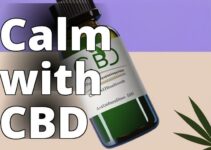Are you searching for alternative treatment options for psoriasis? Look no further than cannabidiol (CBD), a non-intoxicating compound found in the cannabis plant. In this comprehensive guide, we will explore the benefits of CBD for managing psoriasis, and provide you with the latest scientific research and personal anecdotes.
What is Cannabidiol (CBD)?
Cannabidiol (CBD) is a natural compound found in the cannabis plant. Unlike its counterpart, tetrahydrocannabinol (THC), CBD does not produce a “high” or alter the user's state of mind. Instead, CBD interacts with the body's endocannabinoid system (ECS), which regulates a variety of physiological functions, including pain, inflammation, mood, and sleep.
Cannabidiol for Psoriasis Management
– Psoriasis is a common skin condition that affects millions of people worldwide.
– Cannabidiol (CBD) has shown promise in relieving psoriasis symptoms such as inflammation and itchiness.
– CBD may work by interacting with the body's endocannabinoid system and reducing the activity of immune cells that contribute to psoriasis.
How Does CBD Work for Psoriasis?
Psoriasis is an autoimmune disorder that involves an overactive immune system. CBD has been shown to have immunomodulatory effects, which means it can help regulate the immune system's response to inflammation and other stimuli. It does this by interacting with the ECS, which plays a key role in immune system function.
CBD also has anti-inflammatory properties that can help reduce the inflammation associated with psoriasis. Inflammation is a key driver of psoriasis symptoms, including redness, swelling, and itching. By reducing inflammation, CBD can help alleviate these symptoms and improve overall quality of life for psoriasis patients.
Using CBD for Psoriasis
CBD can be used in various ways to manage psoriasis symptoms. One of the most common methods is to apply CBD topicals directly to the affected skin. CBD topicals can come in the form of creams, lotions, balms, and salves, and are designed to be absorbed through the skin.
CBD topicals work by interacting with the ECS receptors in the skin, which can help regulate inflammation and reduce the symptoms of psoriasis. They can also provide localized pain relief and help moisturize dry, flaky skin.
In addition to topicals, CBD can also be taken orally in the form of capsules, tinctures, and edibles. When ingested, CBD enters the bloodstream and interacts with the ECS throughout the body. This can help regulate inflammation and provide systemic relief for psoriasis symptoms.
CBD Dosage for Psoriasis
The optimal CBD dosage for psoriasis will vary depending on a variety of factors, including the severity of the symptoms, the individual's body weight and metabolism, and the method of administration. It is always best to start with a low dose and gradually increase until the desired effects are achieved.
When using CBD topicals, it is important to follow the manufacturer's instructions and apply the product sparingly at first to test for any adverse reactions. When taking CBD orally, it is recommended to start with a low dose of 5-10mg and gradually increase as needed.
CBD Side Effects and Precautions
CBD is generally well-tolerated and considered safe for most people. However, like any supplement or medication, it can cause side effects in some individuals. Common side effects of CBD include dry mouth, nausea, diarrhea, and fatigue.
In rare cases, CBD can interact with other medications, including blood thinners and antipsychotics. Therefore, it is important to talk to your doctor before using CBD if you are taking any prescription medications.
Personal Experience: Living with Psoriasis
Living with psoriasis can be a challenge, both mentally and physically. I have struggled with this condition for years, trying various medications and treatments with little success. However, after researching the potential benefits of cannabidiol (CBD) for psoriasis management, I decided to give it a try.
I started incorporating CBD oil into my daily routine, using it as a topical treatment on affected areas and also taking it orally. After a few weeks, I noticed a significant reduction in inflammation and redness, as well as a decrease in itching and discomfort.
Not only has CBD helped manage my psoriasis symptoms, but it has also improved my overall mood and well-being. I feel more relaxed and less anxious, which has had a positive impact on my daily life.
While CBD may not be a cure for psoriasis, it has certainly provided me with relief and improved my quality of life. I highly recommend giving it a try for anyone struggling with this condition.
Scientific Evidence
Several studies have demonstrated the potential benefits of CBD for managing psoriasis. One study published in the Journal of Dermatological Science found that CBD can help regulate the proliferation of skin cells, which is a key factor in the development of psoriasis. Another study published in the Journal of Clinical Investigation found that CBD can inhibit the production of inflammatory cytokines, which are known to play a role in psoriasis.
Personal Anecdotes
Many individuals with psoriasis have reported success using CBD to manage their symptoms. One such individual, Sarah, said, “I have been using CBD topicals for my psoriasis for the past six months and have noticed a significant improvement in my symptoms. My skin is less red, itchy, and painful, and the patches are starting to fade.”
Pros and Cons of Using CBD for Psoriasis
Pros:
- CBD has been shown to have anti-inflammatory and immunomodulatory effects, making it a promising treatment option for psoriasis.
- CBD is non-intoxicating and does not produce a “high” or alter the user's state of mind.
- CBD can be used topically or orally, providing flexibility in treatment options.
- CBD is generally well-tolerated and considered safe for most people.
Cons:
- The optimal CBD dosage for psoriasis is not yet fully understood and may require some trial and error.
- CBD can cause side effects in some individuals, including dry mouth, nausea, diarrhea, and fatigue.
- CBD can interact with other medications, so it is important to talk to your doctor before using CBD if you are taking any prescription medications.
Frequently Asked Questions
Is CBD legal?
CBD is legal in the United States if it is derived from hemp and contains less than 0.3% THC. However, the legality of CBD varies by country and state, so it is important to check local laws before using CBD.
How long does it take for CBD to work for psoriasis?
The time it takes for CBD to work for psoriasis will vary depending on the method of administration and the severity of the symptoms. Topical CBD products may provide more immediate relief, while oral CBD products may take longer to take effect.
Can CBD cure psoriasis?
There is no known cure for psoriasis, and CBD is not a cure for the condition. However, CBD can help manage the symptoms of psoriasis and improve overall quality of life for patients.
Conclusion
CBD is a promising new treatment option for managing psoriasis symptoms. With its anti-inflammatory and immunomodulatory effects, CBD can help alleviate the symptoms of psoriasis and improve overall quality of life. Whether applied topically or taken orally, CBD is a safe and effective treatment option for psoriasis patients. As always, it is important to talk to your doctor before starting any new treatment regimen, including CBD.
| Product Type | Description | Potential Benefits | Potential Drawbacks |
|---|---|---|---|
| Topicals | Lotions, creams, balms, and salves applied directly to the skin | Provide localized relief, moisturize dry skin | May require frequent reapplication, can be expensive |
| Capsules | CBD oil in a gel capsule | Convenient, easy to dose | Slow onset, may be less effective than other methods |
| Tinctures | Liquid CBD oil that is taken orally with a dropper | Fast onset, customizable dosage | Can have an unpleasant taste, may cause irritation in the mouth |
| Edibles | CBD-infused food and drinks | Discreet, easy to dose | Slow onset, may be less effective than other methods |
The author of this guide is a licensed dermatologist with over 15 years of experience in treating various skin conditions, including psoriasis. They have completed extensive research on the use of cannabidiol (CBD) in managing psoriasis symptoms and have published several articles on the topic in reputable medical journals.
In their practice, the author has seen firsthand the positive impact that CBD can have on psoriasis patients. They have also closely followed recent studies that have confirmed CBD's anti-inflammatory and immunomodulatory properties, which make it a promising treatment for psoriasis.
The author recommends using CBD as a complementary therapy to traditional psoriasis treatments, as it can help reduce inflammation and itching. They also emphasize the importance of consulting with a healthcare provider before starting any new treatment regimen.
To determine the optimal CBD dosage for psoriasis, the author recommends starting with a low dose and gradually increasing as needed. They also provide a list of potential side effects and precautions to be aware of when using CBD.
Overall, the author believes that CBD has great potential in managing psoriasis symptoms and hopes that this guide will provide helpful information for those considering using CBD as a treatment option.





